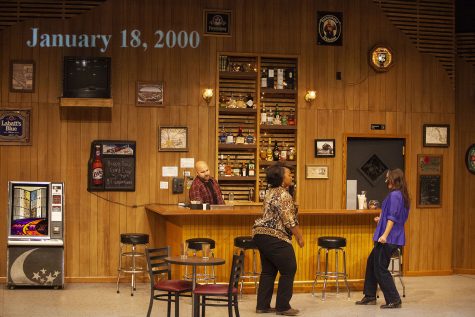Lessons from Sweat: A look at what UI’s upcoming production taught its cast and crew
The cast and crew of the Theater Arts Department’s production of Sweat share how they plan on putting lessons from the show to use.
Benjamin Sulzberger and Keri Eastridge perform as Jason and Tracey during a dress rehearsal of “Sweat” in the David Thayer Theatre on October 8, 2019. The play is centered around the struggles of patrons of a bar in Reading Pennsylvania. Directed by Sarah Lacy Hamilton, the show will open Thursday, October 10 and run through Saturday, October 19. (Jenna Galligan/The Daily Iowan)
October 9, 2019
Upon first glance, a relatively blank set with only a desk and two chairs may seem underwhelming, but much like the play itself, there’s more to Sweat’s set than initially meets the eye.
After the opening scene, the set rotates to reveal a bar that was modeled after a real bar in Reading, Pennsylvania, where the show takes place.
Sweat follows the story of a group of friends in Reading whose lives are forever changed by the economic downturn of 2008. The show explores how deindustrialization affected every aspect of working-class lives, not just their paychecks. Jobs and homes were lost, friendships were torn apart, and relationships crumbled.
To ensure that the story was told correctly, director Sarah Hamilton and dramaturg Morgan Grambo took a three-day trip to Reading to see some key locations in the show and to speak with members of the community.
“That was a challenge we tried to take on for ourselves, to be like, ‘OK, [Playwright Lynn Nottage] was really specific about where this is, so I think we need to acknowledge that and go there,” Grambo said.

During a dress rehearsal of “Sweat” in the David Thayer Theatre on October 8, 2019. The play is centered around the struggles of patrons of a bar in Reading Pennsylvania. Directed by Sarah Lacy Hamilton, the show will open Thursday, October 10 and run through Saturday, October 19.
Grambo said the decision to visit Reading not only helped the team create a more realistic setting, but also allowed the group to learn about the people who live there.
The locals that Grambo and Hamilton spoke with said Sweat has benefited their community by bringing their economic struggle to the forefront.
In addition to their on-location research, Grambo and Hamilton used articles from Reading’s newspaper, The Reading Eagle, as well as headlines from national newspapers such as The New York Times to understand the political climate of Reading at that time.
Nottage included these pieces of information within the script itself. They can be found in the stage directions that precede each scene.
The Sweat team projects images of the headlines onto the set during scene changes so the audience can see which political events affect the characters’ lives at the time. The team also projects the date of each scene onto the set so the audience knows how much time has passed between them.
“Our research kind of relied on using those points to base our conversations around,” Grambo said. “What do the transitions look like, moving date to date, and what does the audience have to understand about this moment in order to understand how it affects our characters?”
Grambo said the characters are what truly drive the story.
“I think Lynn Nottage does everyone a service by showing their angle of a very complicated story,” said Steven Willis, who plays Chris.
Willis said Nottage doesn’t try to convince the audience of which characters are right and which ones are wrong. She allows the audience to see everyone’s point of view and draw their own conclusions.
Keri Eastridge, who plays Tracey, said all the characters are victims of circumstance, with none of them being entirely right or entirely wrong.
“I would hope that the audience leaves with sympathy for every character,” Willis said.
Both Willis and Eastridge initially found it somewhat difficult to get into character because Sweat presents several morally ambiguous situations.
“I think it’s uncomfortable because the things I have to consider are things that I believe are wrong,” Eastridge said.
However, the actors said they understand why their characters think the way they do, even when they don’t agree with them.
“I always try to find the ‘why,’ ” Wills said. “Why would you do this? Why would you say this? Why would you feel this way? I try to live in that space when I’m performing.”
Willis and Eastridge said audiences want to see complex character motivations, citing Joker as an example.
The Joker has been Batman’s nemesis since the 1970s and has been portrayed as evil since his début. Joker creates an origin story that forces its audience to re-evaluate whether The Joker is truly evil or simply a man who’s been driven to madness.
“No one’s necessarily good or bad,” Willis said.
“It’s a spectrum,” Eastridge added.
The pair said Sweat’s value isn’t only found in its characters and their morality — it’s in the reality of the story.
“It’s grounded in a real town that really went through this,” Eastridge said.

Actors perform a scene during a dress rehearsal of “Sweat” in the David Thayer Theatre on October 8, 2019. The play is centered around the struggles of patrons of a bar in Reading, Pennsylvania. Directed by Sarah Lacy Hamilton, the show will open Thursday, October 10 and run through Saturday, October 19.
Despite being set in a specific place, Sweat represents more than just the Reading community, Grambo said. The Sweat team uses the things they learned from the show to try to help the Iowa City community.
“Reading is different than Iowa City, but in a variety of small ways, people can recognize [Iowa City] onstage,” Grambo said. “We have more factories in this area of the state than people realize. It’s definitely an industry that affects a lot of people’s lives.”
The Sweat team had a discussion with the assistant director’s aunt, who’s worked at a Whirlpool factory in Cedar Rapids for more than 20 years, to talk about manufacturing jobs in Iowa.
The team asked her a series of questions that related to the storylines of various characters in the show and found that her experiences were similar to theirs, despite her job being in Cedar Rapids.
The discussion doesn’t end there. After Sweat’s Oct. 13 matinee, the cast and artistic team will host a post-show discussion in which to explore the themes and ideas presented in the show. Grambo hopes this discussion will lead to new ideas that can benefit factory workers in the community.
“We’re still trying to figure out how all that information we took from Reading can be a reciprocal relationship, but we know one way to do it is to turn it towards Iowa City,” Grambo said.














